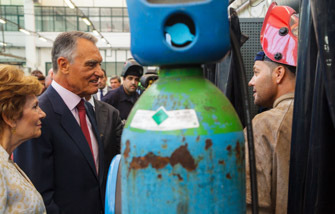
National Symbols
1. Article 11 paragraphs 1 and 2 of the Constitution says:
1 – The National Flag, which shall be the symbol of the sovereignty of the Republic and of Portugal’s independence, unity and integrity, shall be that adopted by the Republic formed by the Revolution of 5 October 1910.
2 – The National Anthem shall be A Portuguesa.
2. As far as ordinary legislation is concerned, mention should be made of Decree-Law nº 150/87 of 30 March, which regulated the use of the flag on national territory, with the exception only of specific military and maritime norms. The flag may be used on all national territory (article 2 nº 1), and it is determined that it must conform to the “official pattern” (as defined in article 11 of the Constitution) and kept in a good state of repair (article 2 nº 2), and must be raised on “Sundays, holidays and on days of official ceremonies or other solemn acts or sessions of a public nature” (article 3 º 1). Furthermore, the Government, the bodies of the governments of the autonomous regions, civil governors, executive bodies of the local authorities and the heads of private institutions may order the national flag to be flown (article 3 nº 2). Finally, on buildings that are the seat of organs of sovereignty the national flag may be flown daily by right (article 3 nº 3). The national flag shall be flown between 9 am and sunset and if flown at night shall whenever possible be spotlighted (article 6, nºs 1 and 2). During periods of national mourning the flag shall be flown at half-mast (article 7 nº 1). Finally, it must be said that when flown with other Portuguese or foreign flags, the national flag shall always occupy the place of honour (article 8).
3. The national symbols are legal assets subject to penal supervision. In 1910, article 3 of the decree having force of law of 28 December determined that “whosoever fails in the respect owed to the national flag that is the symbol of the nation in speech or in published writings or otherwise by other means of publication, shall be sentenced to a prison sentence of three months to one year and the corresponding fine, and in case of relapse the minimum sentence shall be expulsion from national territory, as per article 62 sole § of the Penal Code”. At present, article 332 of the Penal Code establishes a penalty of imprisonment of up to two years or a fine of up to 240 days “for all those who publicly, through words, gestures or in writing or through any other means of communication with the public, offend the Republic, the national flag or the national anthem, the arms and emblems of Portuguese sovereignty”; in the case of regional symbols, the penalty is imprisonment of up to one year or a fine of up to 120 days.
© 2006-2016 Presidency of the Portuguese Republic
You have gained access to the records of the Official Site of the Presidency of the Republic from 9 March 2006 to 9 March 2016.
The contents available here were entered in the site during the 10 year period covering the two mandates of President of the Republic Aníbal Cavaco Silva.